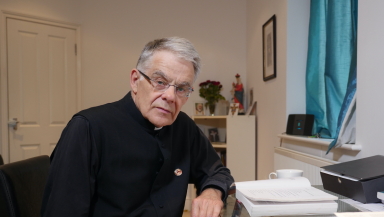
"Diversity takes precedence over religion." This is the rather remarkable statement made by an NHS Trust to Rev Dr Patrick Pullicino, a Catholic Chaplain and former professor of neurosciences. The Rev Dr acted as a Chaplain at the South West London and St George's Mental Health NHS Trust.
On 20 August 2019, Rev Pullicino was assigned to visit a male patient on one of the hospital's mental health wards. The two, at the patient's request, went for a walk outside and talked. During their 20-minute conversation, the patient told Rev Pullicino that he was in a same-sex relationship and that he wished to legally marry his partner. The patient asked Rev. Pullicino his opinion on the matter as a Catholic priest.
At no point did Rev Pullicino condemn the patient or chastise him for his relationship. In fact, he expressed empathy and compassion because the patient's father was at odds with him over the relationship. Nevertheless, in accordance with Rev Pullicino's deeply held beliefs, and the very clear teaching of the Catholic Church, he could not affirm the man in his same-sex relationship or encourage him to get married.
Complaint
As a result of this conversation, the patient complained about Rev Pullicino to the Trust. The following day, Rev Pullicino was barred by another member of staff from entering the ward because of the complaint. Even after the patient was discharged, Rev Pullicino continued to be barred from visiting patients. He was told that the Trust might consider allowing him to return should he submit a formal written response admitting that his comments were against the Trust's values and behaviours, that he understood why his comments were wrong, and that he promised not to re-offend when approached about LGBT matters.
The Trust repeatedly apologised to the patient and launched a formal investigation. In correspondence from the Acting Chief Executive of the Trust, Vanessa Ward, to the patient, the Trust vowed that Rev Pullicino's supervisor would make sure that the Rev Dr understood that Equality and Diversity takes precedence over his religious beliefs.
In an email sent to Rev Pullicino by the Trust, he was also told that: "NHS policy on Equality and Diversity in relation to the complaint supersedes religious standing whilst working and representing the trust."
Not all people are created equal?
While it may be a tautology, it is self-evident that equality should mean that all people are equal in the eyes of the law. When Parliament adopted the Equality Act 2010, it did not create a hierarchy of rights. The Hansard record does not indicate any discussion that one protected characteristic should take precedence over another. In fact, had that been the intention of Parliament, then the statute could not rightly be called the Equality Act. Legislating to make one protected characteristic supersede another would actually make it the 'inequality' act.
Nor does the NHS Trust seem to understand the meaning of the term 'diversity'. Briggs J, writing for the High Court in Smith v Trafford Housing Trust captured the meaning of diversity well when he wrote: "the encouragement of diversity in the recruitment of employees inevitably involves employing persons with widely different religious and political beliefs and views, some of which, however moderately expressed, may cause distress among the holders of deeply felt opposite views."
Perhaps the strangest unintended consequence of the Trust's email to the patient was the implicit admission that the patient's desire to enter a same-sex marriage was contrary to Catholic teaching. By telling the patient that the Trust's staff should respond in a way which affirms the equality principle in question, rather then the religious position, suggests that the religious dogma should be ignored because it is incongruent with same-sex marriage.
Convictions matter
If the Trust's position is to be taken to its logical conclusion, the NHS believes that all members of staff, including chaplains, should disavow their deeply held religious beliefs or values and affirm anyone in behaviour that their conscience and convictions tells them is wrong. The problem with this position is that the NHS would then be void of any chaplains or medical personnel with any real convictions whatsoever, apart from those which affirm LGBT views. And this would ultimately hurt patients.
In a 2009 study, nearly 90 per cent of people interviewed from across the ideological spectrum believed that choosing a healthcare professional with similar values as their own was important. This would logically be true of hospital clergy as well. The case law of the European Court of Human Rights speaks to this fact by noting that the personality of religious ministers is undoubtedly of importance to every member of that religious community. It would be paramount to many patients with sincerely held Christian beliefs that they receive pastoral care from a chaplain with integrity and who believes in the value of religious truth.
In the Book of Revelations, the Church in Laodicea is criticised for being lukewarm, with the prophecy reading that Christ will spit them out for their lack of conviction. This is because beliefs and adherence to beliefs matters to God, as it does to countless believers.
Catholic social teaching
Rev Dr Pullicino is Catholic. The Catholic Church's official teaching on the issue of same-sex attraction is clear:
"Homosexuality refers to relations between men or between women who experience an exclusive or predominant sexual attraction toward persons of the same sex. It has taken a great variety of forms through the centuries and in different cultures. Its psychological genesis remains largely unexplained. Basing itself on Sacred Scripture, which presents homosexual acts as acts of grave depravity, tradition has always declared that "homosexual acts are intrinsically disordered." They are contrary to the natural law. They close the sexual act to the gift of life. They do not proceed from a genuine affective and sexual complementarity. Under no circumstances can they be approved."
"Homosexual persons are called to chastity. By the virtues of self-mastery that teach them inner freedom, at times by the support of disinterested friendship, by prayer and sacramental grace, they can and should gradually and resolutely approach Christian perfection."
Several years ago, when Europe began legislating in favour of same-sex marriage, Pope Benedict wrote that same-sex marriage was a cultural revolution that is opposed to the whole tradition of humanity. He further called the large-scale adoption of same-sex marriage a distortion of conscience; one which could not be answered with some small moralism or exegetical reference alone. He believed the problem ran deeper and must be addressed in fundamental terms.
Rev Pullicino's beliefs are consistent with this teaching, and his concerns about appeasing culture rather than adhering to Church teaching are in line with Pope Benedict's warnings about this issue.
Conclusion
Rev Pullicino's case is now before the Employment Tribunal. Legally, what is clear is that the Trust has failed to do any balancing test whatsoever between the Rev Dr's right to hold and express his religious views as a chaplain and the Trust's zealous adherence to equality (whatever the Trust believes that word to mean). This failure alone implies a breach of Rev Pullicino's legal rights under the Human Rights Act 1998 and the Equality Act 2010.
The deeper concern about this case, however, is the NHS's authoritarian, and frankly blindly fundamentalist adherence to some vague notion of equality which prizes sexual identity above the duty of a chaplain to do his job in accordance with the beliefs of his church. To be clear, to force employees, especially chaplains, to violate their consciences and affirm what they view as sin, would be the end of religious freedom in this country outside of the four walls of our churches.
There is no more radical equality than Christian equality; the belief that we are all created in the image of God. Any equality built by man is nothing more than a Tower of Babel, an edifice that inspires division and confusion. Whatever the outcome of Rev Pullicino's case, he chose God. And for that he will receive a reward greater than any remedy the Employment Tribunal can afford him.
Roger Kiska is a Legal Counsel with the Christian Legal Centre.













